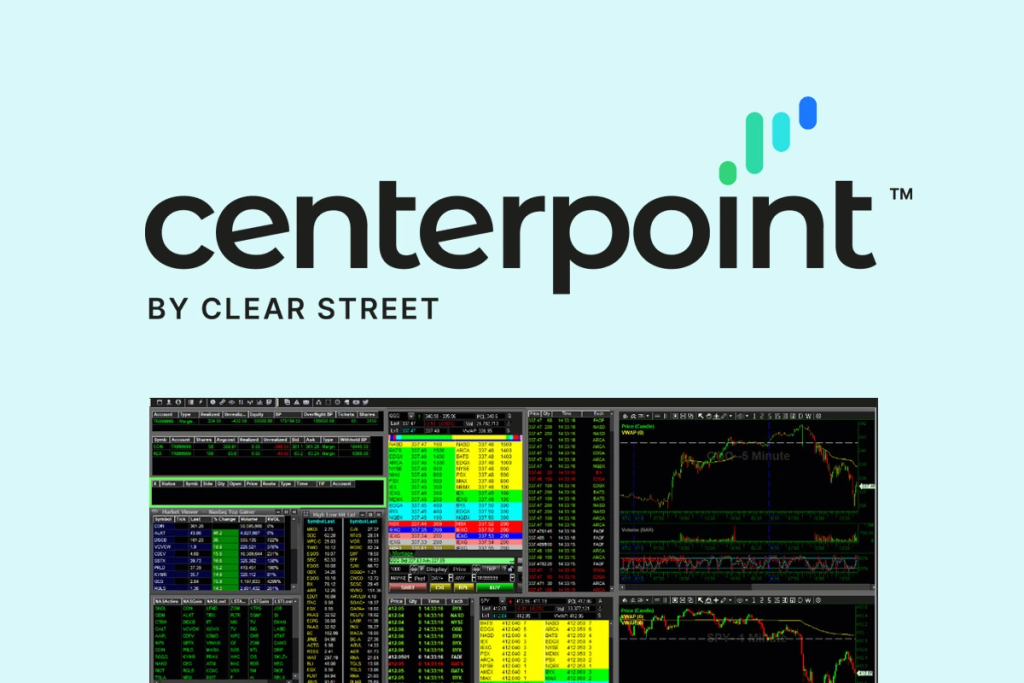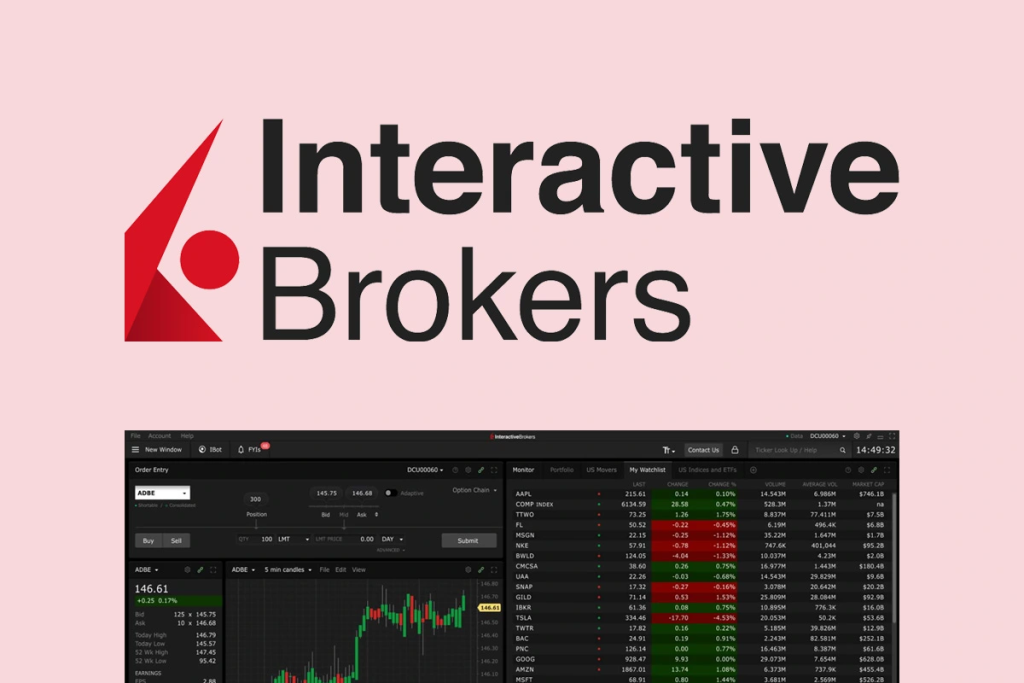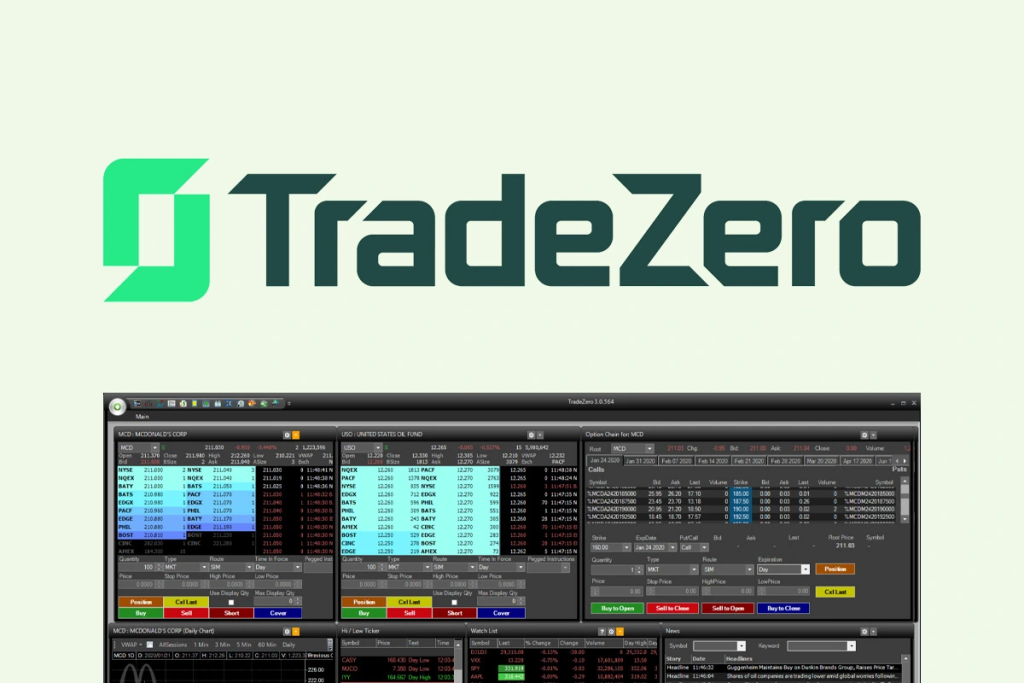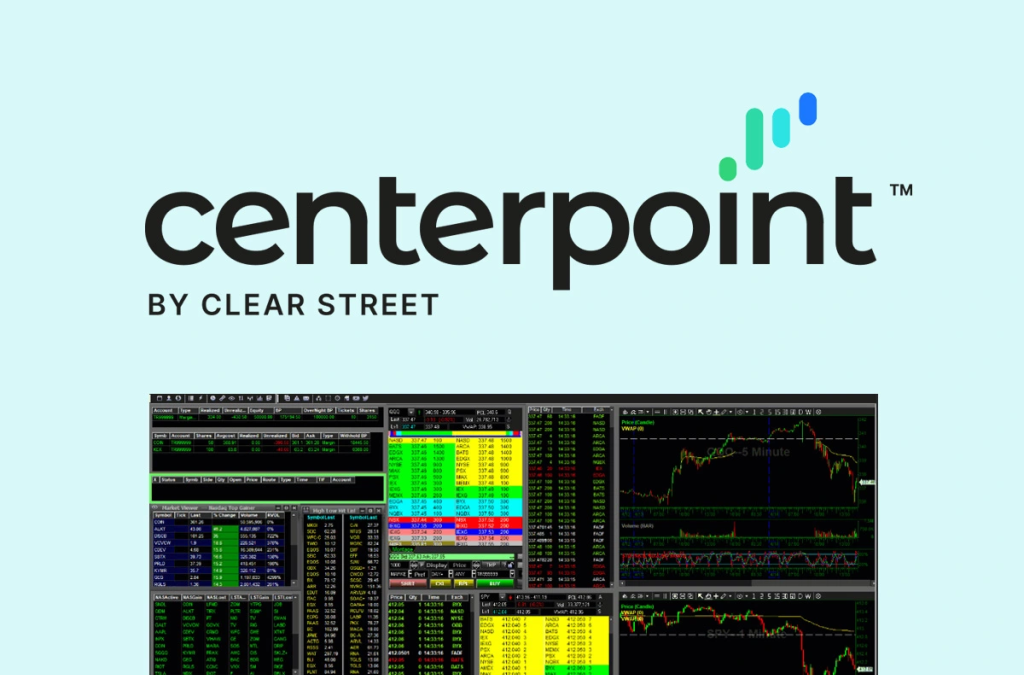Why Choosing the Right Trading Broker Matters
When it comes to trading, your broker can make or break your success. Why do some brokers charge hundreds in fees, while others let you trade commission-free? After over a decade of trading, I’ve tested a variety of platforms—from zero-commission options to premium brokers that cost a small fortune.
Here’s what I’ve learned: Not all brokers are created equal. Have you ever missed the perfect trade because your broker’s platform lagged or order execution was too slow? Or maybe you’ve faced spreads that widen during high volatility, unexpected slippage, or delayed market data. These common frustrations can cost you profits and shake your confidence.
But here’s the good news: The right broker can eliminate these headaches, allowing you to focus on what truly matters—your risk management, trade research, and strategy.
In this guide, I’ll review and rank the most popular US trading brokers. Whether you’re a complete beginner or a seasoned day trader, you’ll discover which broker suits your style, experience level, and trading goals. By the end, you’ll know how to set up a reliable trading platform and take your trading to the next level.
Best Trading Broker for US Traders: CenterPoint Securities

CenterPoint Securities is a premium choice for advanced traders.
(Broker Rating: A)
When it comes to trading, serious traders need serious tools. CenterPoint Securities is the broker I personally use, and while it’s not for everyone, it’s undoubtedly a top-tier choice for advanced traders. Let’s dive into why this broker stands out and whether it’s the right fit for you.
Key Features of CenterPoint Securities
- High Minimum Deposit Requirement
- To open an account with CenterPoint, you’ll need at least $30,000. This steep requirement reflects the broker’s focus on experienced traders who are ready to invest in premium tools.
- This isn’t a platform for beginners, but for those who’ve honed their skills and want to elevate their trading game.
- Lightning-Fast Execution Speed
- CenterPoint’s integration with DAS Trader Pro makes it one of the best in the business for execution speed and precision.
- With customizable layouts and advanced order routing, the platform ensures you’re never a step behind in the fast-paced world of day trading.
- Exceptional Short-Selling Capabilities
- CenterPoint boasts an extensive inventory of hard-to-borrow stocks, making it a favorite among traders who short-sell small-cap stocks or meme stocks.
- Access to shares that other brokers can’t provide gives CenterPoint users a significant edge.
- Competitive Commission Rates
- Starting at $0.0045 per share, CenterPoint’s fees are competitive for high-volume traders. However, smaller traders may find these costs add up quickly.
- Superior Customer Service
- CenterPoint’s responsive and knowledgeable support team understands traders’ needs, providing help during market hours—a crucial feature when every second counts.
Costs to Consider
- Platform Fees: DAS Trader Pro costs $120 per month, plus additional fees for market data and order routing.
- Commissions: While low for high-volume traders, smaller accounts might feel the pinch.
These costs make CenterPoint an investment—but one that pays off for those trading at a higher level.
Who Is CenterPoint For?
CenterPoint is ideal for active day traders and swing traders who prioritize execution speed, advanced tools, and robust short-selling options. If you’re already a profitable trader and looking to scale up, this broker delivers unmatched performance. However, beginners and casual traders may find the high deposit requirement and fees a barrier.
Why We Rated CenterPoint an A
CenterPoint Securities earns its A rating because of its premium tools, exceptional execution speed, and unmatched short-selling inventory. While it’s not beginner-friendly, it’s a perfect fit for advanced traders ready to take their trading to the next level.
Best Trading Broker for Long-Biased and Large-Cap Stock Traders: Interactive Brokers (IBKR)

Interactive Brokers (IBKR) is an affordable and versatile stock trading broker.
(Broker Rating: B)
Interactive Brokers (IBKR) is one of the most popular brokers in the trading world, and for good reason. Offering affordable options, flexible plans, and a range of tools, it caters to traders across all experience levels. Let’s explore why IBKR might be the right fit for you—or where it might fall short.
Key Features of Interactive Brokers
- Flexible Pricing Plans
- IBKR Lite: Offers commission-free trading for U.S.-listed stocks and ETFs, making it a budget-friendly option for beginner traders. Note that this plan is limited to mobile and web platforms.
- IBKR Pro: Designed for more active traders, this plan includes advanced tools like the Trader Workstation (TWS) and commissions as low as $1 per trade or $0.65 per options contract.
- No Minimum Deposit Requirement
- You can open an account with no minimum deposit, making IBKR accessible for new traders.
- However, to access live market data, you’ll need at least $500 USD in your account.
- Low Margin Rates and Interest Payments
- IBKR offers some of the lowest margin rates in the industry, making it an attractive choice for traders using leverage.
- They also pay interest on unused cash balances in your account—a unique perk.
- Improved Charting and Tools
- While the Trader Workstation (TWS) platform is functional, its interface can feel outdated and less intuitive compared to competitors.
- However, the recent integration with TradingView improves the charting experience for traders who value technical analysis.
- Mobile and Web Platforms
- IBKR’s mobile app is excellent for swing trading and long-term investing, allowing you to manage trades on the go. However, it’s not ideal for day trading due to execution limitations.
Shortcomings of Interactive Brokers
- Platform Usability: TWS, though feature-rich, has a steep learning curve and feels less modern than competitors’ platforms.
- Short-Selling Limitations: While IBKR is great for large-cap stocks, its inventory for hard-to-borrow shares (like small-cap and meme stocks) is limited compared to brokers like CenterPoint or TradeZero.
- Fees for Market Data: Live market data subscriptions can range from $6 to $20 per month, although these fees may be waived for frequent traders.
Who Is IBKR For?
Interactive Brokers is perfect for beginner traders looking for a cost-effective and flexible broker. It’s also a good option for swing traders and long-term investors who prioritize affordability. However, if you’re a scalper or need ultra-fast execution for day trading, IBKR may not meet your needs.
Why We Rated IBKR a B
IBKR earns a B rating for its accessibility, competitive fees, and reliable features. While it’s a solid choice for many traders, it loses points for its clunky platform interface and limited short-selling inventory for small caps.
Popular Trading Brokers: Charles Schwab & Thinkorswim
Charles Schwab and Thinkorswim are excellent for charting, but lags in execution.
(Broker Rating: C)
Charles Schwab and its Thinkorswim platform are popular choices among beginner traders, particularly for those who love technical analysis. However, this broker’s strengths are counterbalanced by some notable drawbacks, especially for active day traders.
Key Features of Charles Schwab / Thinkorswim
- Top-Tier Charting Tools
- Thinkorswim offers some of the best charting capabilities in the retail trading world. Its intuitive platform makes it ideal for traders who rely on detailed technical analysis and enjoy tools like drawing indicators directly on charts.
- Commission-Free Trading
- Schwab provides $0 commissions for U.S.-listed stocks and ETFs, as well as options trading at just $0.65 per contract. This pricing structure is great for beginners looking to keep costs low.
- Paper Trading for Beginners
- Thinkorswim includes a robust paper trading feature, allowing new traders to practice their strategies in a risk-free environment.
Shortcomings of Charles Schwab / Thinkorswim
- Lagging Performance in High Volatility
- Thinkorswim’s platform can lag during periods of high market volatility, which is a major drawback for day traders who need precise execution and real-time updates.
- Slow Order Execution
- While Thinkorswim excels in charting, its execution speed is slower than brokers like CenterPoint or IBKR. This can result in missed opportunities during fast-moving markets.
- Limited Short-Selling Capabilities
- Schwab’s inventory for hard-to-borrow shares is limited, making it unsuitable for traders who focus on shorting small-cap or meme stocks.
Who Is Charles Schwab / Thinkorswim For?
This broker is best for beginners and long-term traders who prioritize intuitive charting tools and commission-free trading. It’s also a good choice for those who want to practice trading strategies using the paper trading feature. However, active day traders or anyone who relies on fast execution and short-selling opportunities may find Thinkorswim inadequate.
Why We Rated Schwab / Thinkorswim a C
While Schwab and Thinkorswim shine in charting and user-friendliness, their execution lags, limited short-selling inventory, and performance issues during high volatility hold them back. For beginner-friendly charting, it’s a great tool, but it’s not suitable for live trading in fast-moving markets.
Best Trading Broker for Beginner Short Sellers: TradeZero US

TradeZero is a good starting point for beginner small-cap stock short sellers.
(Broker Rating: C)
TradeZero US has been gaining traction as a go-to broker for beginners and traders looking to explore short selling. While it offers several features that make it attractive for new traders, there are critical performance and cost considerations to keep in mind.
Key Features of TradeZero US
- Low Account Minimum
- With a minimum deposit of just $500 USD, TradeZero is one of the most accessible brokers for beginners, making it an appealing starting point for those with smaller accounts.
- Short-Selling Capabilities
- TradeZero shines when it comes to short-locate inventory, offering traders access to shares that are hard to borrow on other platforms. This is a key advantage for those experimenting with shorting small-cap or meme stocks.
- Commission-Free Trading for Limit Orders
- TradeZero offers commission-free trading on limit orders of over 100 shares, making it a cost-effective option for smaller accounts.
- Customer Support
- Responsive and beginner-friendly, TradeZero’s customer service team is a great resource for traders who may need extra assistance while learning the ropes.
Shortcomings of TradeZero US
- Platform Performance Issues
- TradeZero’s flagship platform, ZeroPro, charges a monthly fee of $59 but tends to freeze during high-volatility periods. This can be highly frustrating for active day traders who rely on speed and reliability.
- Cost Considerations
- While entry costs are low, borrow fees for shorting stocks can be expensive, especially for traders with smaller accounts.
- Additional fees, including live market data subscriptions, can also add up as you scale your trading.
- Limited Execution Quality
- The mobile app and free web platform are decent for basic trades, but they lack the advanced features and execution quality required for active day trading.
Who Is TradeZero For?
TradeZero is a good fit for beginner traders who want to test short-selling strategies without committing to a high account minimum. It’s also suitable for traders focusing on small-cap shorts, given its extensive locate inventory. However, as you grow and require faster execution and more reliable tools, you may need to transition to a premium broker.
Why We Rated TradeZero a C
TradeZero earns its C rating for its beginner-friendly low deposit requirement and excellent short-locate capabilities. However, platform reliability issues and costly borrow fees prevent it from being a standout option for more experienced or high-frequency traders.
Best Paper Trading and Beginner Trading Brokers: Moomoo vs. Webull
Webull and MOOMOO are zero-commission platforms for beginners.
(Broker Rating: B for Webull, C for Moomoo)
Moomoo and Webull are two of the most popular zero-commission trading platforms among beginners. While they share many similarities, there are key differences that set them apart. Let’s explore what each platform offers and which might be better suited for your trading style.
What They Have in Common
- $0 Commissions
- Both Moomoo and Webull offer commission-free trading on stocks, ETFs, and options, making them cost-effective choices for new traders.
- Paper Trading Features
- Both platforms provide robust paper trading capabilities, allowing users to practice strategies and get comfortable with the tools without risking real money.
- User-Friendly Mobile Apps
- Their mobile apps are sleek and intuitive, perfect for tracking your portfolio and placing trades on the go. Beginners who prefer trading from their phones will find these platforms easy to navigate.
Key Differences Between Moomoo and Webull
- Desktop Platform Quality
- Webull: Offers a more intuitive and trader-friendly desktop platform, ideal for active traders who rely on detailed technical analysis. Its charting tools are superior, making it better suited for those who focus on short-term trades.
- Moomoo: Feels more suited to investors rather than traders. While it offers comprehensive market data and research tools, its platform can feel clunky for active trading.
- Research and Market Data
- Moomoo excels in providing in-depth research reports and market data, making it a great choice for investors who prioritize fundamental analysis.
- Webull, on the other hand, is more geared toward traders who rely on technical analysis.
- Execution Speed and Direct Market Access
- Neither platform offers direct market access, which means slower execution speeds during periods of high volatility. This is a significant limitation for day traders who rely on speed and precision.
- Short-Selling Capabilities
- Both platforms offer limited short-selling inventories, especially for small-cap stocks. If short selling is a key part of your strategy, these platforms may not meet your needs.
Who Are Moomoo and Webull For?
- Webull: Best for new traders looking to practice technical analysis and develop trading consistency. The platform is better suited for active traders experimenting with short-term trades.
- Moomoo: Better for investors focused on research and fundamental analysis. Its tools are more tailored to longer-term strategies.
Why We Rated Webull a B and Moomoo a C
- Webull earns a B rating for its better charting tools, intuitive desktop platform, and suitability for beginners interested in technical analysis.
- Moomoo, while excellent for market research, gets a C rating because it’s less trader-friendly and lacks the features active traders need for faster execution.
Popular Trading Broker: E*TRADE
E*Trade is an option for all-around options trader.
(Broker Rating: B)
ETRADE is one of the oldest and most well-known trading brokers in the U.S. Its long-standing reputation, combined with user-friendly tools and affordable fees, makes it a solid option for both beginners and experienced traders. Let’s explore what makes ETRADE unique and where it could improve.
Key Features of E*TRADE
- Affordable Trading Costs
- $0 Commissions: E*TRADE offers commission-free trading for U.S.-listed stocks and ETFs, helping to keep trading costs low.
- Options Pricing: Options trades cost $0.65 per contract, with a discounted rate of $0.50 per contract if you make more than 30 trades per quarter, making it attractive for options traders.
- User-Friendly Platforms
- E*TRADE Pro: The broker’s desktop platform is intuitive and packed with features like advanced charting, research tools, and real-time market data.
- Mobile App: E*TRADE’s mobile app is excellent for monitoring portfolios and placing trades on the go, appealing to long-term investors and swing traders.
- Paper Trading and Education
- E*TRADE provides paper trading tools and educational resources, making it a great option for beginners looking to practice their strategies and learn about the markets.
- Integrated Research Tools
- The platform includes a wealth of research tools and market insights, giving traders access to detailed data and analysis.
Shortcomings of E*TRADE
- Platform Performance During High Volatility
- While E*TRADE Pro is robust, it can experience slowdowns during periods of high market activity, which may frustrate day traders who rely on fast execution.
- Limited Short-Selling Inventory
- E*TRADE offers some short-selling capabilities, but its inventory for hard-to-borrow stocks is limited compared to brokers like CenterPoint or TradeZero.
- Not Ideal for Scalpers
- The platform’s execution speed and reliability may not meet the needs of scalpers or ultra-active traders who require lightning-fast performance.
Who Is E*TRADE For?
E*TRADE is an excellent option for long-term investors, swing traders, and options traders who want a reliable and easy-to-use platform. It’s also great for beginners who want to explore trading with paper accounts and benefit from a wealth of educational resources. However, day traders and scalpers who require top-notch execution speed and short-selling capabilities may find it lacking.
Why We Rated E*TRADE a B
E*TRADE earns its B rating for its affordable fees, strong platform features, and suitability for a wide range of traders. While it isn’t the best choice for high-frequency or advanced day traders, it remains a reliable and well-rounded option for most trading needs.
Conclusion: Use the Right Broker to Elevate Your Trading
Selecting the right trading broker is one of the most important decisions for any trader, whether you’re just starting out or are an experienced professional. Each broker offers a unique set of features, costs, and tools, making it essential to match your choice with your trading goals and style.
You can visit my Recommended Brokers page to use my EXCLUSIVE sign-up bonuses and deals!
Here’s a quick recap of the brokers we reviewed:
- CenterPoint Securities (A): Best for advanced traders who need lightning-fast execution, advanced tools, and exceptional short-selling capabilities. Its high deposit requirement and fees make it unsuitable for beginners but a premium choice for professionals.
- Interactive Brokers (B): A versatile option for beginner and intermediate traders, offering competitive fees and flexible plans. However, its clunky platform and limited short-selling inventory hold it back for advanced day traders.
- Charles Schwab / Thinkorswim (C): Excellent for beginners focused on charting and long-term strategies, but slow execution and platform lag make it unreliable for active day trading.
- TradeZero US (C): A solid starting point for beginner short sellers, with a low account minimum and strong locate inventory. However, platform performance issues and high borrow fees limit its scalability.
- Moomoo vs. Webull (B for Webull, C for Moomoo): Zero-commission platforms ideal for beginners practicing trading or investing. Webull shines for technical analysis, while Moomoo excels in research tools. Neither is ideal for live day trading due to slower execution.
- E*TRADE (B): A well-rounded broker for swing traders, long-term investors, and options traders. Affordable fees and user-friendly tools make it accessible, but it lacks the speed and short-selling depth needed by advanced traders.
Key Takeaways
- If you’re a beginner, start with affordable platforms like Webull, E*TRADE, or Interactive Brokers to learn and practice trading strategies.
- For short sellers, CenterPoint Securities or TradeZero US offer the tools and inventories needed for success.
- Active day traders looking for top-tier execution and professional tools should consider CenterPoint Securities despite its higher costs.
Next Steps
Ready to take the next step in your trading journey? Explore the brokers that caught your attention and use the links provided for exclusive sign-up bonuses, free platform trials, and more. Each broker has unique features that can align with your goals, so choose wisely to elevate your trading game.
The post Best Trading Brokers for US Traders: Compare, Choose, and Trade Smart appeared first on Humbled Trader.

